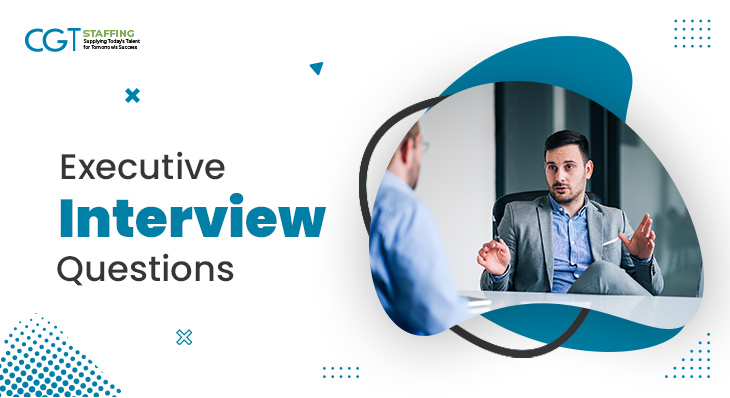In the dynamic world of business, finding the best fit for your organization is a critical endeavor. The interview process empowers you to uncover valuable insights about potential leaders and contributors, but it’s essential to ask the right questions. Whether it’s executive assistant interview questions or questions for any other position, it’s imperative to understand the candidate’s qualifications and suitability for the role.
Let’s explore the key questions to ask when interviewing for executive roles, ensuring you make the best decisions for your organization.
Table of Contents
What to Consider Before Finalizing Interview Questions

When crafting interview questions for executive roles, consider the candidate’s strategic vision, leadership qualities, problem-solving skills, and industry-specific expertise. Tailor questions to assess their ability to steer the organization and adapt to dynamic challenges. The organization’s talent acquisition strategy should be designed to render actionable information about the candidates in the hiring pipeline.
What Motivates You to Lead?
Understanding a candidate’s motivation is crucial. Ask about their leadership philosophy and what drives them to pursue executive roles; the answer is often a window into their passion for leadership and offers insight into how he or she might align with your organization’s values.
Describe Your Leadership Style.

Explore their leadership approach. Are they more collaborative or authoritative? Do they value employee development and empowerment? Understanding style is essential to assessing compatibility with your organization’s culture.
Can You Share Your Proudest Leadership Achievement?
When asking executive-level final interview questions, it is crucial to gauge the candidate’s ability to set and achieve goals. Pay attention to the narrative – it should reflect his or her past successes and how those achievements contributed to the previous organizations’ growth.
How Do You Handle High-Stress Situations?
Executive roles often come with high-pressure situations. Assess candidates’ ability to stay composed, make informed decisions, and adapt to challenging circumstances.
What’s Your Vision for Our Organization?
This question helps you evaluate a candidate’s strategic thinking. The response to this question should demonstrate a deep understanding of your company’s goals and an actionable plan for achieving them.
Describe a Time You Faced a Leadership Challenge.

Listen to the candidate explain his or her problem-solving abilities and resilience. Executives need to navigate complex issues effectively.
How Do You Foster Innovation in Your Team?

Innovation is crucial for staying competitive. Assess the ability to encourage creativity and adaptability within larger teams. In businesses operating in highly tech-oriented markets, it is important to assess possible responses to changing market conditions. Specialized recruiters or staffing agencies, like telecom staffing agencies, can help you to develop relevant questions to satisfy this prerequisite.
What Are Your Key Performance Indicators (KPIs) for Leadership?
KPIs reflect their expectations for success in an executive role. Ensure alignment with your organization’s objectives and performance measurement metrics.
Can You Share Examples of Your Conflict Resolution Skills?

Leaders must resolve conflicts efficiently. Understanding your interviewee’s approach to conflict management is vital to maintaining a harmonious work environment.
Describe Your Approach to Talent Development.
An executive’s role involves nurturing talent within the organization. Ask about his or her knowledge of or opinion on any relevant strategies – direct hire recruiting or outsourcing when expanding a team, for example. Assess the commitment to employee growth and development.
What Strategies Would You Implement to Drive Organizational Growth?
Seek insights into strategic thinking. The candidate’s response should encompass market analysis, competition assessment, and growth strategies.
How Do You Stay Informed About Industry Trends and Best Practices?
Executives need to stay ahead of industry trends. Response should highlight a commitment to continuous learning and professional growth.
What Are Your Short-Term and Long-Term Career Goals?
This question can help you evaluate the candidate’s alignment with the organization’s long-term vision and his or her commitment to the role.
How Would You Handle a Team Member’s Underperformance?
Gauge the ability to address and rectify issues within a team, emphasizing constructive feedback and support.
Describe a Situation Where You Had to Make a Tough Decision.
Evaluate decision-making and the capacity to make difficult choices while considering long-term consequences. You should also gauge his or her opinion on workplace behavior and what constitutes what is insubordination.
How Do You Ensure Ethical Conduct in Your Leadership Role?
Ethical leadership is paramount. Assess his or her commitment to upholding ethical standards and integrity.
Can You Share Your Experience in Crisis Management?
Evaluate the candidate’s ability to handle crises and his or her preparedness to protect the organization’s interests.
What Are Your Expectations Regarding Support and Resources for Your Role?
Assess the candidate’s practicality and whether his or her expectations align with your organization’s capabilities.
Ultimately, the right executive can steer your organization to new heights, so choose wisely. With a well-structured set of questions, you can ensure that you hire an executive who not only meets your organization’s needs but also shares your vision for the future. Need help in conducting interviews? You can always contact the premier staffing agency Pittsburgh.
